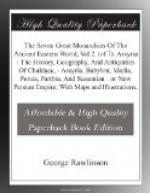If from physical we proceed to mental characteristics, we seem again to have in the Jewish character the best and closest analogy to the Assyrian. In the first place, there is observable in each a strong and marked prominency of the religious principle. Inscriptions of Assyrian kings begin and end, almost without exception, with praises, invocations, and prayers to the principal objects of their adoration. All the monarch’s successes, all his conquests and victories, and even his good fortune in the chase, are ascribed continually to the protection and favor of guardian deities. Wherever he goes, he takes care to “set up the emblems of Asshur,” or of “the great gods;” and forces the vanquished to do them homage. The choicest of the spoil is dedicated as a thank-offering in the temples. The temples themselves are adorned, repaired, beautified, enlarged, increased in manner, by almost, every monarch. The kings worship them in person, and offer sacrifices. They embellish their palaces, not only with representations of their own victories and hunting expeditions, but also with religious figures—the emblems of some of the principal deities, and with scenes in which are portrayed acts of adoration. Their signets, and indeed those of the Assyrians generally, have a religious character. In every way religion seems to hold a marked and prominent place in the thoughts of the people, who fight more for the honor of their gods than even of their king, and aim at extending their belief as much as their dominion.
Again, combined with this prominency of the religious principle, is a sensuousness—such as we observe in Judaism continually struggling against a higher and purer element—but which in this less favored branch of the Semitic family reigns uncontrolled, and gives to its religion a gross, material, and even voluptuous character. The ideal and the spiritual find little favor with this practical people, which, not content with symbols, must have gods of wood and stone whereto to pray, and which in its complicated mythological system, its priestly hierarchy, its gorgeous ceremonial, and finally in its lascivious ceremonies, is a counterpart to that Egypt, from which the Jew was privileged to make his escape.
The Assyrians are characterized in Scripture as “a fierce people.” Their victories seem to have been owing to their combining individual bravery and hardihood with a skill and proficiency in the arts of war not possessed by their more uncivilized neighbors. This bravery and hardihood were kept up, partly (like that of the Romans) by their perpetual wars, partly by the training afforded to their manly qualities by the pursuit and destruction of wild animals. The lion—the king of beasts—abounded in their country, together with many other dangerous and ferocious animals. Unlike the ordinary Asiatic, who trembles before the great beasts of prey and avoids a collision by flight if possible, the ancient Assyrian




